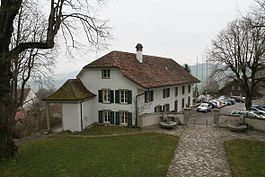Schlosswil
| Schlosswil | ||
|---|---|---|

The Amtshaus of Wil Castle
|
||
|
||
| Coordinates: 46°55′N 7°37′E / 46.917°N 7.617°ECoordinates: 46°55′N 7°37′E / 46.917°N 7.617°E | ||
| Country | Switzerland | |
| Canton | Bern | |
| District | Bern-Mittelland | |
| Area | ||
| • Total | 3.45 km2 (1.33 sq mi) | |
| Elevation | 753 m (2,470 ft) | |
| Population (Dec 2016) | ||
| • Total | 632 | |
| • Density | 180/km2 (470/sq mi) | |
| Postal code | 3082 | |
| SFOS number | 0624 | |
| Surrounded by | Biglen, Grosshöchstetten, Konolfingen, Trimstein, Worb | |
| Website |
www SFSO statistics |
|
Schlosswil is a municipality in the Bern-Mittelland administrative district in the canton of Bern in Switzerland.
Schlosswil is first mentioned in 1146 as Wilare. Until 1902 it was known as Wyl.
The earliest trace of a settlement in the area include scattered Bronze Age artifacts as well as carved granite block of indeterminate age. A few Roman era artifacts have also been found near the Schlossallee street. During the Middle Ages, a fortress (German: Burg Wil) was built near the village and it became the seat of the Herrschaft of Schlosswil. The lords of the fort, the Freiherren von Wiler, were first mentioned in 1146. The von Wiler family died out around 1300, and the village and associated territory passed through several noble families including, the Freiherren von Signau and eventually the Senn von Münsingen family. The territory was split in half and passed through several Bernese patrician families until Burkhard von Erlach reunited the two halves in 1514.
In 1546 the medieval castle was destroyed in a fire. Shortly thereafter it was rebuilt as a larger castle under the direction of the master builder Niklaus von Wattenwyl-May. The current appearance comes from a 1780 renovation that gave the castle a Baroque exterior. The various noble families continued to rule over the village and Herrschaft until 1798.
The village church of St. Germanus was first mentioned in 1239. The current building dates back to 1660.
Until it was dissolved in 2010, the District of Konolfingen was administered out of the castle in Schlosswil. The district administration was one of the major employers in the municipality. However, about three-quarters of the working population commutes to jobs in Bern, Thun or other nearby cities.
...
Wikipedia




